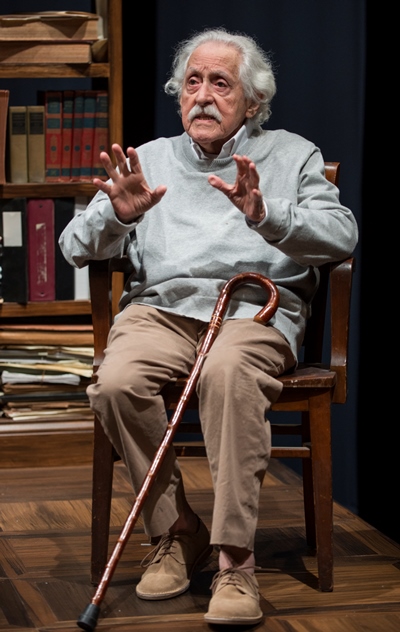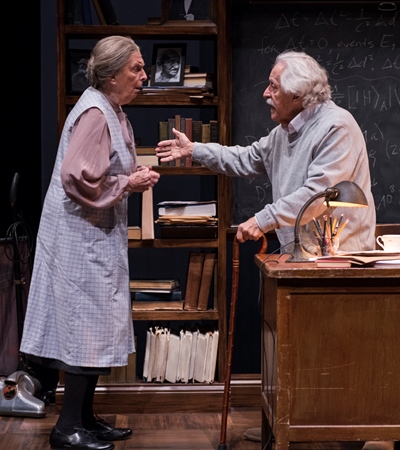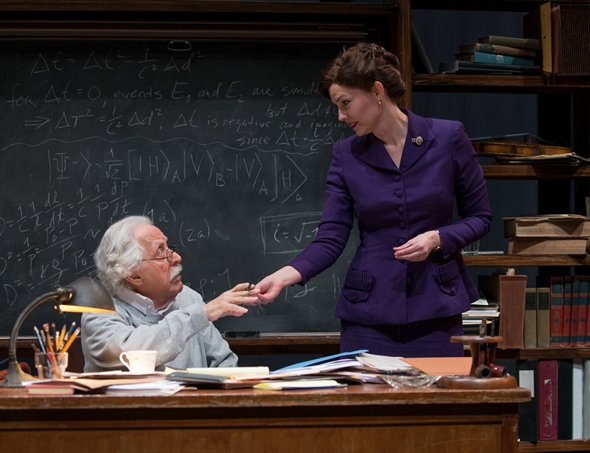‘Relativity’ at Northlight: In pursuit of Einstein, and confronting the hard reality of genius
Review: ‘Relativity’ by Mark St. Germain, directed by BJ Jones at Northlight Theatre, extended through June 25. ★★★★
By Lawrence B. Johnson
The nature of genius, its obsession and its isolation, lies at the core of Mark St. Germain’s taut, indeed irreducible play “Relativity,” a fictional perspective on Albert Einstein that bears the resonance of reality at Northlight Theatre — thanks to a stellar turn by Mike Nussbaum as the larger-than-life theoretical physicist.
Einstein (1879-1955) was beyond famous. He was a rock star in his own time, an epoch that essentially began in 1905 – the “miracle” year in which, at age 26, he published four earthshaking papers, including his theory of relativity and the equivalency of mass and energy expressed with legendary simplicity as E=mc².
 But St. Germain’s little play, a keyhole glimpse into an imagined moment in Einstein’s life, isn’t vitally interested in the concept of physical relativity, or its theoretical competitor quantum mechanics – though both are demonstrated in an amusing bit of saucer-tossing. No, the matter of this 70-minute rhetorical flourish is ethical relativity. It could be distilled into the mundane question: Was this genius also a good man? To which the wizard of St. Germain’s reinvention well might answer that the question itself is irrelevant.
But St. Germain’s little play, a keyhole glimpse into an imagined moment in Einstein’s life, isn’t vitally interested in the concept of physical relativity, or its theoretical competitor quantum mechanics – though both are demonstrated in an amusing bit of saucer-tossing. No, the matter of this 70-minute rhetorical flourish is ethical relativity. It could be distilled into the mundane question: Was this genius also a good man? To which the wizard of St. Germain’s reinvention well might answer that the question itself is irrelevant.
The setup here is a visit to Einstein’s home near Princeton University, where he in fact conducted research in his later years. The visitor is Margaret Harding (Katherine Keberlein), an over-eager reporter who’s dying to meet the great man and get the straight dope on a couple of questions about his early years. Margaret, who’s on the cusp of middle age, has a prodigiously brilliant adolescent son of her own. However, she’s new at this job and is perhaps trying too hard to keep the conversation going. Not far into the interview, Einstein sees what this is really all about.
And this far into the review, I’ll admit the play is hard to write about without revealing more than I prefer to do – for your sake, dear reader. But I’m resolved to keep the beans in the bag. If what follows is an exercise in circumspection, so be it. The higher principle should prevail. And that is essentially what Einstein tells the reporter when their chat turns to ethics, man’s obligation to his fellow man (or indeed woman), personal sacrifice, doing the right thing and all that.
 Remarkably, quite astonishingly to the woman with the poised pen, Einstein does not come down on the side of conventionally correct behavior — you know, family first or, for that matter, family at all if that implies children. When Margaret pushes back, insisting on the natural duties of spouse, parent, man to his fellow man, Einstein lapses into resigned disappointment that this woman before him is, after all, quite ordinary. Truly exceptional people – the Einsteins of the world – are not concerned — nor can the afford to be, he declares — with the routine distractions of this brief life. Their work, their creativity, the spreading wings of their rare capacity: Those things and those things alone have real, lasting value as gifts to the whole of humanity.
Remarkably, quite astonishingly to the woman with the poised pen, Einstein does not come down on the side of conventionally correct behavior — you know, family first or, for that matter, family at all if that implies children. When Margaret pushes back, insisting on the natural duties of spouse, parent, man to his fellow man, Einstein lapses into resigned disappointment that this woman before him is, after all, quite ordinary. Truly exceptional people – the Einsteins of the world – are not concerned — nor can the afford to be, he declares — with the routine distractions of this brief life. Their work, their creativity, the spreading wings of their rare capacity: Those things and those things alone have real, lasting value as gifts to the whole of humanity.
And therein lies the beauty of Nussbaum’s assured and sly, but also dark and world-weary performance. First of all, the 93-year-old actor looks the part down to his toes. But more than that, there’s a nuanced truth in Nussbaum’s physicality, his punctuating movements, the unexpected bursts of energy, the dazzling luminosity that sometimes beams from his face, the visible sinking in dismay. This is masterful acting, genuine ownership of a complicated character and an imposing role.
 Actually, “Relativity” has the distinct feel of a monodrama. Keberlein’s Margaret is little more than Einstein’s interlocutor. And for comic pauses, we’re given his old housekeeper (Ann Whitney), protective and dour. It is Einstein’s speeches that inspire the playwright and inherently command our attention. The interloper Margaret is merely everywoman. Einstein recognizes that plain truth, which only reminds him of the unbridgeable gulf between the likes of him and the rest of humankind.
Actually, “Relativity” has the distinct feel of a monodrama. Keberlein’s Margaret is little more than Einstein’s interlocutor. And for comic pauses, we’re given his old housekeeper (Ann Whitney), protective and dour. It is Einstein’s speeches that inspire the playwright and inherently command our attention. The interloper Margaret is merely everywoman. Einstein recognizes that plain truth, which only reminds him of the unbridgeable gulf between the likes of him and the rest of humankind.
Eventually, the conversation turns to God, or the probability of God. Einstein takes what might be termed the Voltaire position: If there’s some higher being with a keen interest in humanity, explain the human toll of earthquakes, tsunamis, hurricanes. And yet the definer of relativity manages a position of relative religiosity. He is not an atheist, he says, but an agnostic. His idea of God is that of the 17th-Century Dutch philospher Baruch Spinoza: God is in everything, in people and rocks and trees and chairs. But a supreme intervenor who keeps us all safe and to whom we can make our personal appeals? Absolutely not.
This is where “Relativity” misses the forceful, toe-to-toe counter-argument of St. Germain’s “Freud’s Last Session,” with its sizzling philosophical debate between the atheistic psychoanalyst and the devout born-again Christian C.S. Lewis. This woman who has wandered into Einstein’s domain (Jack Magaw’s detailed set is a gem) is ill equipped to slug it out with him. Yet, Nussbaum’s performance carries its own value. Relatively speaking, it is well worth the time, the trek and the price.
Related Link:
- Performance location, dates and times: Details at TheatreinChicago.com
Tags: Ann Whitney, BJ Jones, Jack Magaw, Katherine Keberlein, Mark St. Germain, Mike Nussbaum, Northlight Theatre, Relativity


